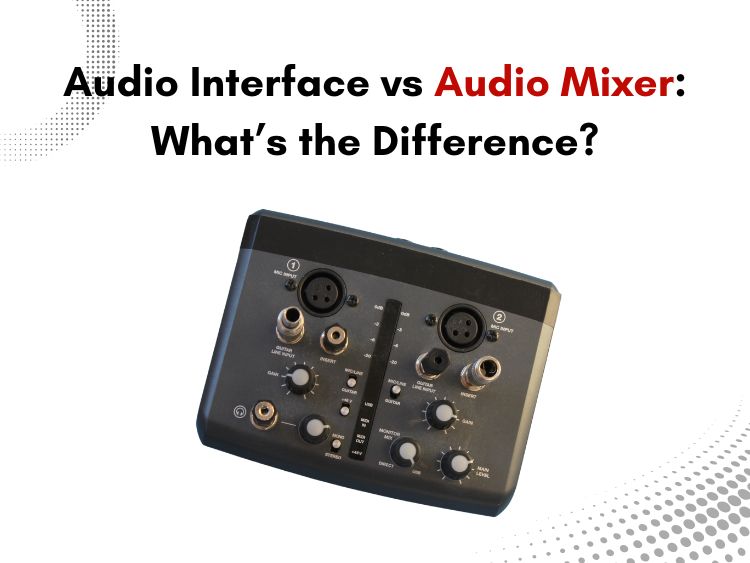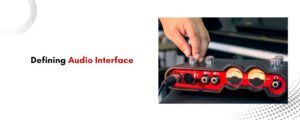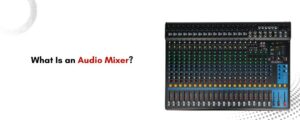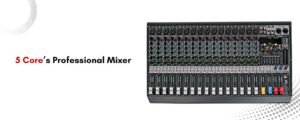In the world of audio production—whether you’re a podcaster, live performer, DJ, or home studio owner—knowing the difference between an audio interface and an audio mixer can transform the way you capture and process sound. These two tools might look similar at first glance, and they often share overlapping functions. However, they serve distinct purposes, and choosing the right one can significantly impact your sound quality, workflow, and creative potential.
Let’s dive deep into their differences, explore how they’re used, and see which tool is better for your needs—complete with expert advice, specs, and practical product recommendations.
Defining Audio Interface
An audio interface is a hardware device that connects your microphones, instruments, or line-level sources to your computer. It converts analog signals into digital audio for recording and playback. Interfaces typically feature high-quality preamps, line/instrument inputs, headphone outs, and low-latency performance.
Key Functions:
- Analog-to-digital and digital-to-analog conversion
- Clean preamps for recording vocals and instruments
- USB or Thunderbolt connection to your DAW
- Simple signal routing
Best For:
- Home studio recording
- Podcasting
- Voiceover artists
- Solo musicians
Limitations:
- Limited real-time control
- Usually fewer inputs/outputs compared to mixers
What Is an Audio Mixer?
An audio mixer allows you to combine, route, and adjust multiple audio signals in real-time. Whether you’re mixing a live show or studio session, a good-quality audio mixer offers tactile control over volume, EQ, panning, effects, and routing. Some mixers also include USB interfaces, blending both analog control and digital recording.
One of the most versatile and professional options is the 5 Core Audio Mixer 24-Channel DJ Mixing Board. This affordable audio mixer is packed with features such as:
- 24 channels with ultra-low noise analog circuitry
- Built-in Bluetooth and USB audio interface
- Multiple effects processors
- Flexible EQ, gain, and pan controls
- Durable, tour-ready chassis
Mixer vs Interface: Core Differences
| Feature | Audio Interface | Audio Mixer |
| Main Purpose | Digital conversion & recording | Live mixing & signal routing |
| Connectivity | USB/Thunderbolt to DAW | Analog or USB with real-time control |
| Inputs/Outputs | Limited (2-8 typically) | Extensive (up to 24+ channels) |
| Use Case | Studio work, solo artists | DJs, live sound, band practice |
| Control | Software-dependent | Hardware-based, tactile control |
Use Cases: Which One Do You Need?
1. Podcasting or Solo Recording
If you’re recording one or two mics and prefer post-production control in a DAW, an audio interface is your best bet. It’s portable, affordable, and delivers excellent audio fidelity.
2. Live DJ Setup or Band Rehearsal
You’ll need a durable audio mixer with multiple inputs, real-time EQ, and onboard effects. For instance, the 5 Core Audio Mixer 24-Channel from 5 Core Business is ideal. This best audio mixer seamlessly blends analog mixing with digital output, giving DJs and live performers the best of both worlds.
3. Studio and Stage Hybrid
Some mixers now double as USB interfaces, offering the flexibility to record multitrack sessions while managing a live mix. The PLS 5 Core Audio Mixer is one such hybrid solution—a good-quality audio mixer for both live and recording needs.
Real-World Specs: 5 Core’s Professional Mixer
Let’s break down the technical capabilities of the 5 Core Audio Mixer to better understand its value:
- 24 Total Channels: Ideal for full band or multi-source inputs
- Built-in USB & Bluetooth: Plug-and-play for streaming, recording, or playback
- Professional EQ & Effects: Onboard 3-band EQ, FX send/return, and internal DSP
- LED Level Meters & Mute Control: Quick visual feedback and real-time adjustment
- Durability: Designed with a sturdy chassis and heat-dissipating layout for long-term use
It combines affordability, flexibility, and professional-grade features, making it an easy recommendation for both beginners and professionals.
Where to Buy the Best Audio Mixer
1. 5 Core
5 Core is known globally for manufacturing innovative and rugged pro-audio gear. Their direct-to-consumer site ensures authentic products, warranty coverage, and easy support. They’re especially popular among touring musicians, sound engineers, and AV pros.
2. Business 5 Core
This B2B-focused platform offers bulk deals and professional-grade solutions. It’s ideal for event companies, DJs, or production houses that need consistent quality with commercial support. Their logistics and fulfillment ensure timely delivery and competitive pricing on all durable audio mixers.
3. Pro Light & Sound (PLS)
PLS is a one-stop destination for lighting, sound, and staging gear. Their curated selection ensures quality and performance, especially for event planners and AV technicians. They stock the latest best audio mixer options from 5 Core, ensuring genuine parts and accessories.
Expert Tips Before You Buy
- Consider I/O Needs: Count how many mics, instruments, and playback sources you’ll use.
- Mobility vs Power: Choose an interface for portability, but a mixer for comprehensive control.
- Hybrid Features: If your workflow includes both live and studio work, a USB-enabled mixer is ideal.
- Budget Smartly: A professional affordable audio mixer like the 5 Core 24-channel model provides excellent ROI.
Verified Customer Reviews
Sanjay D. (DJ & Music Producer):
“I switched from an interface to the 5 Core 24-Channel Mixer. It’s a game changer for my DJ sets. Real-time control, effects, and seamless Bluetooth pairing—it’s everything I needed.”
Maria L. (Event Organizer):
“We ordered mixers in bulk through Business 5 Core. Great support and pricing. These mixers are solid and survived four large events with zero issues.”
Alex R. (Home Studio Owner):
“I used to struggle with latency issues. The mixer from PLS not only sounds amazing, but it’s also user-friendly. Worth every penny!”
Conclusion
In the battle between audio interface vs audio mixer, it’s not about which is better—it’s about what’s right for you. If you need portability and pristine recording, an audio interface is ideal. But if you’re managing multiple sources live or want hands-on control with onboard effects, a best audio mixer like the 5 Core 24-Channel model is unbeatable.
For creators who need a balance of flexibility, durability, and affordability, we highly recommend checking out the affordable audio mixer options from 5 Core and its partner sites.
Ready to elevate your sound?
Shop the best audio mixer now at 5 Core, Business 5 Core, or PLS. Whether you’re streaming, mixing, or recording, trust in proven quality and professional support.




